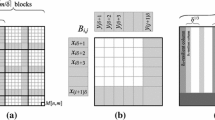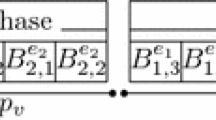Abstract
We introduce a formal framework to study the time and space complexity of computing with faulty memory. For the fault-free case, time and space complexities were studied using the “pebbling game” model. We extend this model to the faulty case, where the content of memory cells may be erased. The model captures notions such as “check points” (keeping multiple copies of intermediate results), and “recovery” (partial recomputing in the case of failure). Using this model, we derive tight bounds on the time and/or space overhead inflicted by faults. As a lower bound, we exhibit cases where f worst-case faults may necessitate an Ω(f) multiplicative overhead in computation resources (time, space, or their product). The lower bound holds regardless of the computing and recomputing strategy employed. A matching upper-bound algorithm establishes that an O(f) multiplicative overhead always suffices. For the special class of tree computations, we show that faults can be handled with an O(f) additive factor in memory, and only a constant multiplicative overhead in time.
Part of this work was carried out while the author was with the Department of Applied Math., The Weizmann Institute of Science.
Supported by a Koret Foundation fellowship.
Preview
Unable to display preview. Download preview PDF.
Similar content being viewed by others
References
S. Cook. “An Observation on Time-Storage Trade-off”. JCSS 9 (1974), 308–316.
C.E. Hewitt and M.S. Paterson. “Comparative Schematology”. Project MAC Conf. on Concurrent Systems and Parallel Computation, Woods Hole, Mass., 1970, 119–127.
J. Hopcroft, W. Paul, and L. Valiant. “On Time Versus Space”. JACM 24(2), 332–337, 1977.
T. Lengauer and R. E. Tarjan. “Asymptotically tight bounds on time-space tradeoffs in a pebble game”. Journal of the ACM, 29:1087–1130, 1982.
J. von Neumann, and O. Morgenstern. “Theory of games and economic behavior”. Princeton University Press, Princeton, 1944.
M. O. Rabin. ”Efficient Dispersal of Information for Security, Load Balancing and Fault Tolerance”. JACM 36(2):335–348, 1989.
M. O. Rabin. ”The Information Dispersal Algorithm and its Applications”. In Sequences, R. M. Capocelli (Editor), 406–419, Springer-Verlag, 1990.
R. Sethi. “Complete Register Allocation Problems”. SIAM J. Comput., 4 (1975), 226–248.
Author information
Authors and Affiliations
Corresponding author
Editor information
Rights and permissions
Copyright information
© 1994 Springer-Verlag Berlin Heidelberg
About this paper
Cite this paper
Aumann, Y., Bar-Ilan, J., Feige, U. (1994). On the cost of recomputing: tight bounds on pebbling with faults. In: Abiteboul, S., Shamir, E. (eds) Automata, Languages and Programming. ICALP 1994. Lecture Notes in Computer Science, vol 820. Springer, Berlin, Heidelberg. https://doi.org/10.1007/3-540-58201-0_57
Download citation
DOI: https://doi.org/10.1007/3-540-58201-0_57
Published:
Publisher Name: Springer, Berlin, Heidelberg
Print ISBN: 978-3-540-58201-4
Online ISBN: 978-3-540-48566-7
eBook Packages: Springer Book Archive




